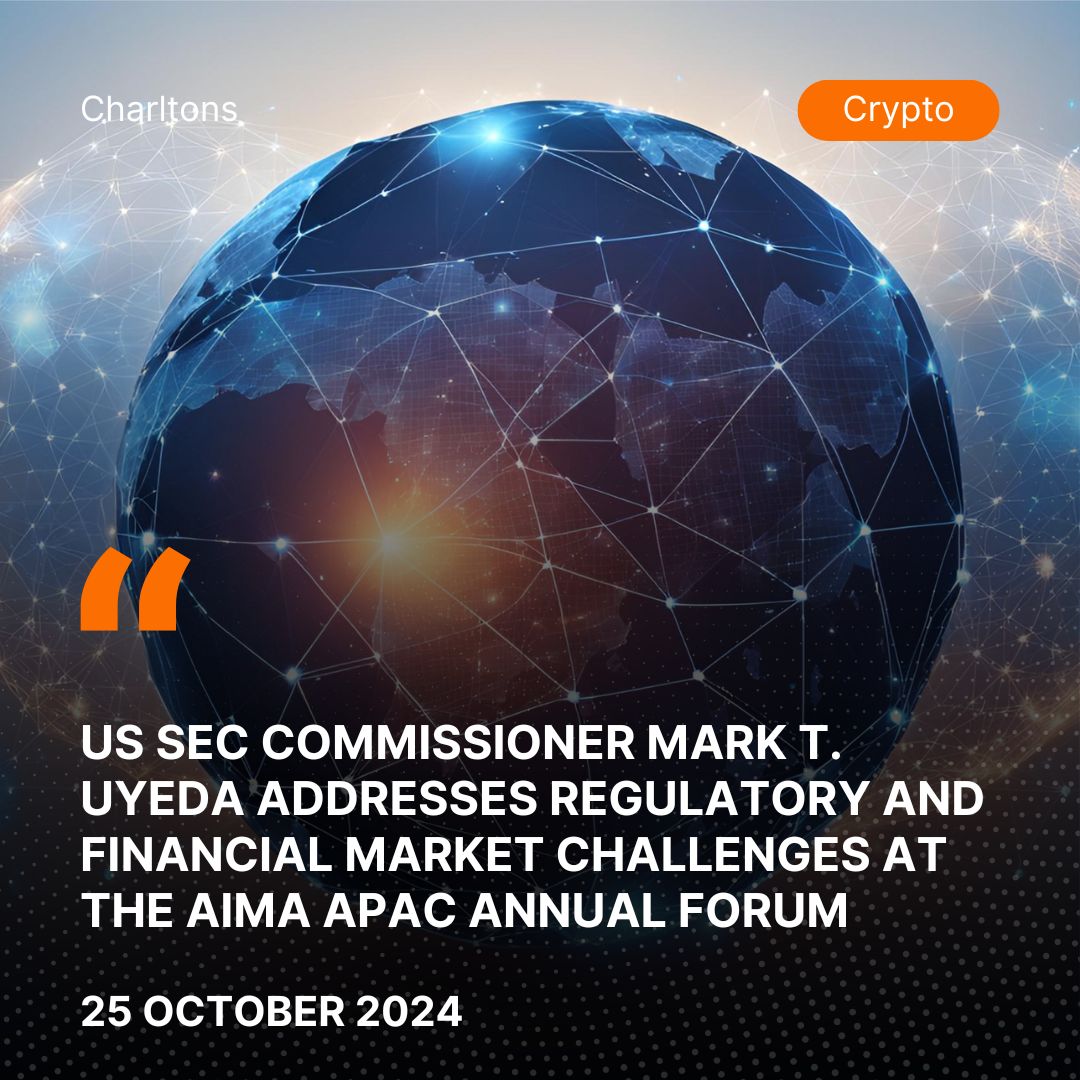
On 24 October 2024, U.S. SEC Commissioner Mark T. Uyeda addressed the AIMA APAC Annual Forum in Hong Kong, discussing the Indo-Pacific’s expanding role in global economic dynamics and the importance of fostering strong economic ties with this rapidly growing region. Mark T. Uyeda in her speech talked about how the increased integration among Indo-Pacific nations could drive mutually beneficial investment, while putting emphasis on how cross-border cooperation could fuel economic growth, raise living standards, and enhance stability across the region. He put forth the idea that maintaining high regulatory standards, upholding free-market principles, and ensuring strong protections for intellectual property rights are essential for building the trust that becomes the cornerstone of sustainable financial development.
Mark T. Uyeda talked about growing skepticism surrounding alternative investments, challenging the portrayal of private funds as shadow banking entities that could threaten financial stability. He argued that since the 2008 financial crisis, the shift of financial activity into the non-banking sector was both expected and beneficial, given banks’ constrained ability to provide risk capital needed by startups and innovative businesses. Private investments such as private equity, private credit, and real assets, he said, are crucial for financing sectors where traditional banks may be limited. Uyeda opposed regulatory moves to impose stringent requirements on private funds, explaining that the SEC’s rule for annual audits and other compliance obligations not only overstepped regulatory bounds but also ignored the financial sophistication of institutional investors. He noted that in June 2024, a U.S. appeals court had vacated the SEC’s rule on private funds, a decision he hoped would prompt the SEC to be more mindful of its regulatory limits in the future.
Reflecting on the US SEC’s approach to crypto and fintech, Uyeda highlighted the gap between the United States and its international counterparts. He expressed concern that the US SEC’s regulatory approach lacks clear guidelines for determining when crypto assets qualify as securities, leaving market participants uncertain and requiring them to infer rules from enforcement actions. Uyeda criticized the current system, which forces crypto issuers to register under existing frameworks like Form S-1, a general form that often fails to address the unique risks and considerations pertinent to digital assets. This regulatory ambiguity, he argued, neither protects investors nor fosters capital formation. Uyeda urged for more tailored and specific guidelines that could provide the clarity needed for innovation, investment, and effective market participation.
Throughout his remarks, Mark T. Uyeda acknowledged the Indo-Pacific region’s proactive stance on crypto and fintech, commending leaders like Hong Kong, Singapore, Japan, and Australia for taking a more adaptive approach to digital asset regulation. Hong Kong’s stablecoin licensing initiative, Singapore’s fintech funding programs, Japan’s regulatory guidelines for crypto exchanges, and Australia’s regulatory sandbox, he explained, demonstrate a sophisticated understanding of balancing investor protection with capital innovation. Uyeda praised these countries for their commitment to fostering fintech growth within an accessible regulatory framework, noting that the U.S. could benefit from similar openness to public engagement and regulatory adaptability.
Addressing the importance of international regulatory collaboration, Mark T. Uyeda noted the critical role that forums such as the International Organization of Securities Commissions (IOSCO) and the Financial Stability Board (FSB) play in global oversight. However, he voiced concern that these organizations often lean heavily on European regulatory philosophies, particularly prudential frameworks that prioritize financial stability above market growth. Uyeda argued that for these bodies to truly serve as global forums, they should incorporate more diverse perspectives, particularly from the Indo-Pacific region. He also advocated for a balanced approach to risk management that considers the unique role of capital markets in economic growth, countering narratives that cast non-bank finance as a systemic risk.
Mark T. Uyeda encouraged increased involvement from Indo-Pacific nations in global regulatory discussions, emphasising the value of their perspectives on emerging areas like leverage, crypto, and derivatives regulation. He commended AIMA’s role in these dialogues and urged further engagement from industry stakeholders to shape the future of alternative investments on an international scale. Marking the intersection of regulatory caution and financial innovation, Uyeda called for a globally harmonized approach that supports market growth while preserving financial stability across the world.
(Source: https://www.sec.gov/newsroom/speeches-statements/uyeda-remarks-2024-aima-apac-annual-forum)





